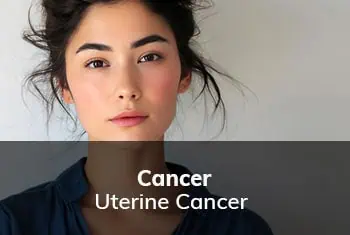What is uterine cancer?
Uterine cancer is a broad term that is generally used interchangeably to describe cancer of the uterus or endometrial cancer. However, these two types of cancer differ.
Endometrial cancer begins in the endometrium, or the lining of the uterus. According to the American Cancer Society, endometrial carcinoma is the most common cancer of the female reproductive system. It commonly occurs after menopause, with the average age of diagnosis being 60.
Alternatively, uterine sarcoma is a much rarer type of cancer that also falls under the uterine cancer umbrella. Sarcoma is a type of cancer that begins in the soft tissues and bones. In the case of uterine sarcoma, it starts in the muscular walls of the uterus, known as the myometrium.Endometrial carcinosarcoma is the rarest type, in which cancer cells have characteristics of both endometrial carcinoma and sarcoma. The National Cancer Institute reports that endometrial carcinosarcoma accounts for less than 5% of all uterine cancers.
Although the bottom part or end of the uterus is the cervix, cancer of the cervix is referred to as cervical cancer. It is a different type of cancer than uterine or endometrial cancer.
What are the causes of uterine cancer?
Researchers aren’t exactly sure what causes uterine cancer. Cancer happens when cells begin to grow and divide uncontrollably, eventually spreading to nearby tissues and even other parts of the body. Something occurs within the uterus that causes the uterine cells to mutate and spread, forming a tumor, but the exact cause hasn’t been identified.
Still, researchers have been able to identify certain risk factors for uterine and endometrial cancer.
What are uterine cancer risk factors?
Many of the risk factors of endometrial cancer are associated with a woman’s reproductive hormones, namely, estrogen and progesterone. Hormonal imbalances can contribute to other female health conditions, like polycystic ovary syndrome (PCOS), which are often risk factors for uterine cancer.
Other risk factors include:
- Hormone replacement therapy. Predominantly, estrogen replacement therapy (ERT) is a therapy that prescribes estrogen without progesterone.
- Age. The risk of endometrial cancer, the most common cancer of the uterus, increases as you get older.
- Obesity. Hormonal balance can be affected by excess weight and fat tissue.
- Family history. Some genetic disorders, like Lynch syndrome, can increase the risk of developing uterine cancer.
- Diabetes. While the link was thought to be between obesity, a symptom of diabetes, and endometrial cancer, researchers believe there may be other associations between the disease and cancer risk.
- Ovarian diseases. Ovarian tumors can cause elevated estrogen levels and suppressed progesterone levels, increasing the likelihood of uterine cancer.
- Menstruation and reproductive history. Women who started menstruating before age 12, entered menopause after age 50, or have infertility and have never been pregnant have a higher risk.
- Endometrial hyperplasia. Irregular thickening of the lining of the uterus is considered to be a precancerous condition.
- Medications. Certain medications and procedures, such as radiation therapy to the pelvis or the drug tamoxifen (used for breast cancer), can increase the risk of uterine cancer.
What are the signs and symptoms of uterine cancer?
Like other conditions that affect the reproductive organs, signs of womb cancer can be easily missed or attributed to something else. Common symptoms include abnormal vaginal bleeding or discharge along with pelvic pain or pressure. Signs of endometrial cancer include:
- Vaginal bleeding between periods before menopause
- Vaginal bleeding or spotting post-menopause
- Pain in the pelvis or lower abdomen
- Cramping unrelated to menstruation
- Thin, transparent, or white discharge post-menopause
- Long, heavy, or frequent periods if you’re 40 or older
- Any pain, bleeding, or discharge that is unusual for your menstrual cycles or occurs after menopause should be discussed with our doctor.
Diagnosing uterine cancer
When checking for signs of endometrial cancer, Dr. Aliabadi usually starts with a discussion of your health history before moving on to a physical exam and pelvic exam. It is important to note that common reproductive cancer screenings, like a Pap test, cannot screen for or diagnose uterine cancer. This test only checks for cervical cancer. Currently, there is no screening tool for endometrial or uterine cancer.
If our doctor suspects cancer, additional testing is often required to confirm the diagnosis.
Additional tests used for diagnosing uterine cancer
Blood tests, imaging, and biopsies may be needed to confirm a diagnosis of uterine cancer. Additional testing can include:
- CT scans
- Blood tests
- Magnetic resonance imaging (MRI)
- Transvaginal ultrasound
- Endometrial biopsy (a sampling of endometrial tissue taken from inside the uterus via an inserted long, thin tube)
- Hysteroscopy (a long thin tube with a camera that is inserted into the uterus and transmits images of the endometrium)
- Dilation and curettage (D&C)

How is uterine cancer treated?
Treatment depends on the stage and type of uterine cancer. Dr. Aliabadi will refer you to a specialist in oncology. Cancer treatment may include chemotherapy, radiation, hormone therapy, immunotherapy, surgery, or a combination of these treatment options. A hysterectomy, a surgical procedure to remove the uterus and cervix, is the most common treatment. The procedure may also include a salpingo-oophorectomy to remove the ovaries and fallopian tubes and possibly a dissection of nearby lymph nodes to check if the cancer has spread.
Have questions about your health? Talk to Dr. Aliabadi
Dr. Aliabadi and her compassionate team are experts in women’s health care. When treated by Dr. Aliabadi, you’re guaranteed to feel safe, heard, and well cared for.
We invite you to establish care with Dr. Aliabadi. Please make an appointment online or call us at (844) 863-6700.
The practice of Dr. Thais Aliabadi and the Outpatient Hysterectomy Center is conveniently located for patients throughout Southern California and the Los Angeles area. We are near Beverly Hills, West Hollywood, Santa Monica, West Los Angeles, Culver City, Hollywood, Venice, Marina del Rey, Malibu, Manhattan Beach, and Downtown Los Angeles.
While your uterine cancer outlook can depend on several factors, statistics have shown that the 5-year survival rate for women diagnosed with womb cancer is about 81%. The most common type, endometrial cancer, is generally curable, especially if it is caught at an early stage.
The average age of diagnosis of uterine cancer and cancer of the uterine lining is 60. It is rare for women under the age of 45 to be diagnosed with womb cancer.
Endometrial cancer grows slowly, which is why there are not many signs and symptoms of endometrial cancer early on. However, more aggressive cancers like uterine serous carcinomas and endometrial adenocarcinoma cancer can spread quickly and often require more aggressive treatment.
Sources
Key Statistics for Endometrial Cancer
https://www.cancer.org/cancer/types/endometrial-cancer/about/key-statistics.html
Uterine Carcinosarcoma Study
https://www.cancer.gov/ccg/research/genome-sequencing/tcga/studied-cancers/uterine-carcinosarcoma-study
Survival Rates for Endometrial Cancer
https://www.cancer.org/cancer/types/endometrial-cancer/detection-diagnosis-staging/survival-rates.html
















